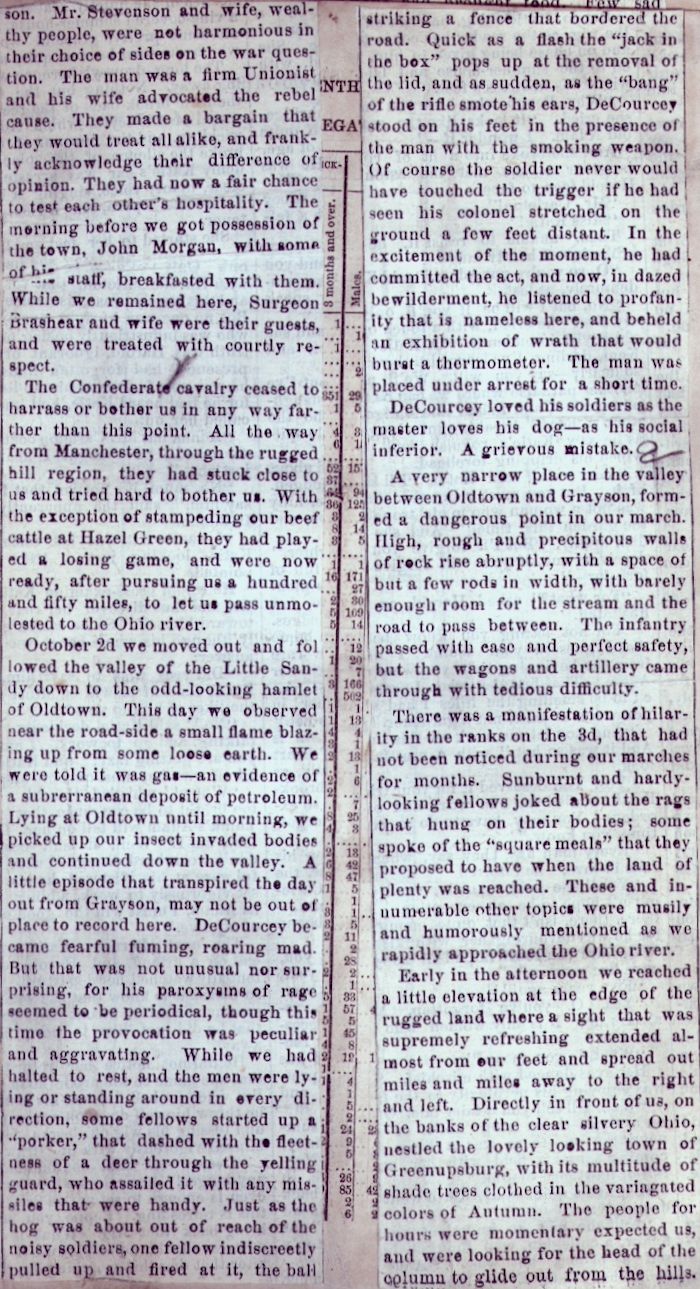| Camp & Field Page 38H | Camp & Field Index Page | 16th OVI Home Page | Camp & Field Page 40 |
The Camp & FieldArticles by Theodore Wolbach |
 Cpl. Theodore D. Wolbach |
The following image is taken from a book titled "Mortality and Statistics of the Census of 1850" in which it is believed retired Captain Rezin H. Vorhes, Company H, pasted over the pages a series of articles written by Cpl. Theodore D. Wolbach, Company E, titled "Camp and Field" and published, by chapter, in the Holmes County (Ohio) Republican newspaper from February 24, 1881 to August 17, 1882. The articles tell the story, in great detail and color, of the 16th OVI, from the inception of the 3-year regiment in October, 1861, through all its camps, battles and marches until it was disbanded on October 31, 1864. The articles pasted in the Vorhes book cover the first 35 chapters, published through October 20, 1881. All the remaining chapters were recently found in a Holmes County library by researcher Rob Garber who obtained copies, performed the transcriptions and provided to this website and which are also presented here, thus providing the complete work by Theodore Wolbach.
Throughout these articles click on the underlined white text for additional details.
The webauthor thanks 16th Ohio descendant Rob Garber for his excellent research on the Camp And Field articles and for performing the tedious digital transcription of those articles found on each page. The transcriptions were made to reflect the original articles verbatim, misspellings and all. Rob is the 3rd great nephew of Capt. William Buchanan, Company F, 16th Ohio, who served in the 90-day regiment as a private, re-enlisting in the three year regiment, and eventually making the rank of Captain of Company F. Thanks Rob!
Page 39 - Chapter 25 - October, 1862
 |
son. Mr. Stevenson and wife, wealthy people, were not harmonious in their choice of sides on the war question. The man was a firm Unionist and his wife advocated the rebel cause. They made a bargain that they would treat all alike, and frankly acknowledge their difference of opinion. They had now a fair chance to test each other's hospitality. The morning before we got possession of the town, John Morgan, with some of his staff, breakfasted with them. While we remained here, Surgeon Brashear and wife were their guests, and were treated with courtly respect. The Confederate cavalry ceased to harass or bother us in any way farther from this point. All the way from Manchester, through the rugged hill region, they had stuck close to us and tried hard to bother us. With the exception of stampeding our beef cattle at Hazel Green, they had played a losing game, and were now ready, after pursuing us a hundred and fifty miles, to let us pass unmolested to the Ohio river. October 2d we moved out and followed the valley of the Little Sandy down to the odd-looking hamlet of Oldtown. This day we observed near the road-side a small flame blazing up from some loose earth. We were told it was gas--an evidence of a subrerranean [sic] deposit of petroleum. Lying at Oldtown until morning, we picked up our insect invaded bodies and continued down the valley. A little episode that transpired the day out from Grayson, may not be out of place to record here. DeCourcey became fearful fuming, roaring mad. But that was not unusual nor surprising, for his paroxysms of rage seemed to be periodical, though this time the provocation was peculiar and aggravating. While we had halted to rest, and the men were lying or standing around in every direction, some fellows started up a |
striking a fence that bordered the road. Quick as a flash the DeCourcey loved his soldiers as the master loves his dog--as his social inferior. A grievous mistake. A very narrow place in the valley between Oldtown and Grayson, formed a dangerous point in our march. High, rough and precipitous walls of rock rise abruptly, with a space of but a few rods in width, with barely enough room for the stream and the road to pass between. The infantry passed with ease and perfect safety, but the wagons and artillery came through with tedious difficulty. There was a manifestation of hilarity in the ranks on the 3d, that had not been noticed during our marches for months. Sunburnt and hardy-looking fellows joked about the rags that hung on their bodies; some spoke of the Early in the afternoon we reached a little elevation at the edge of the rugged land where a sight that was supremely refreshing extended almost from our feet and spread out miles and miles away to the right and left. Directly in front of us, on the banks of the clear silvery Ohio, nestled the lovely looking town of Greenupsburg, with its multitude of shade trees clothed in the variegated colors of Autumn. The people for hours were momentary expected us, and were looking for the head of the column to glide out from the hills. |
| Camp & Field Page 38H | Camp & Field Index Page | 16th OVI Home Page | Camp & Field Page 40 |